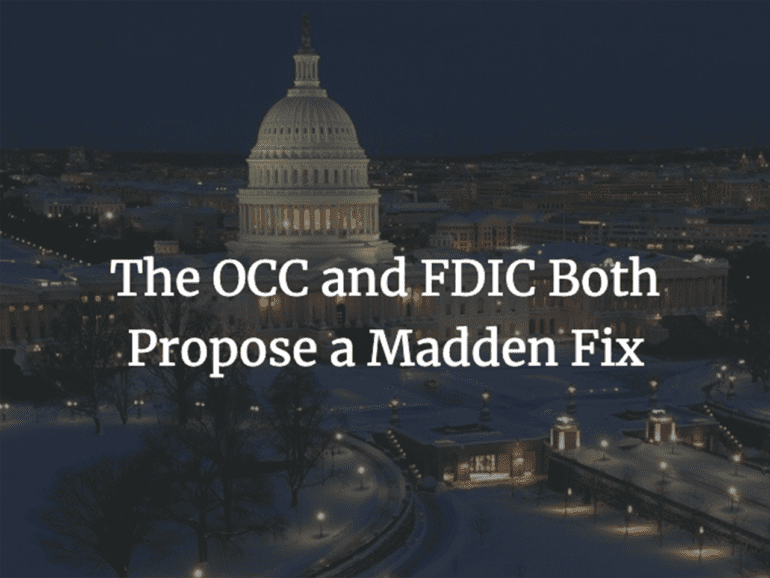The Madden saga has been plaguing the marketplace lending industry for years now. We have covered this issue on Lend Academy more than any other regulatory topic. Ever since the 2015 Madden v. Midland decision by the Second Circuit the industry has been weighed down by uncertainty.
There is finally some real light at the end of the tunnel. In the last two days we have heard from both the OCC and the FDIC on the Madden issue, something they called unfathomable in a joint amicus brief in Colorado a couple of months ago. They have each given notice of their proposal that would clarify the “valid when made” doctrine once and for all.
At the core of the issue is the ambiguity created by the Madden decision. A loan can be valid when it is made but if it is sold or transferred can suddenly become invalid in the Second Circuit states of NY, CT and VT. This has led to reduced consumer lending to these states and also concern that, given no regulatory clarity, this could expand to other states.
Here are links to the OCC and FDIC proposals. There will be a 60-day comment period where interested parties can weigh in. Given the high profile nature of this case many public comments have already been made from several interested parties.
Reaction to the OCC and FDIC Proposals
Nat Hoopes of the Marketplace Lending Association (MLA) has been working on the Madden issue for over three years, basically since he took the job. Here he is quoted in this American Banker piece:
Following the Madden decision, academic research has shown that underserved communities in New York and the other 2nd Circuit states have suffered both a decline in access to credit and a spike in personal bankruptcies; these proposed rules from the OCC and FDIC are a key step towards ending the consumer harm and ensuring that banks can build responsible fintech partnerships.
Scott Stewart of the Innovative Lending Platform Association told this to Politico:
We believe this ruling will help ensure everyday Main Street small-business owners have access to efficient, low-cost funding. The action successfully balances customer protections, availability of credit through a national lending market, and safe and sound bank originated lending — especially at a time of rapid technological change and innovation.
Consumer Bankers Association President Richard Hunt said in a statement also in Politico:
We are encouraged by regulators’ willingness to reinforce long-standing doctrine. Providing clarity for both banks and consumers is the responsible course of action and will help ensure the soundness of our nation’s banking system.
There was also plenty of criticism of the OCC and FDIC for going down this path, particularly from consumer advocacy groups. The Associate Director of the National Consumer Law Center, Lauren Saunders, said this in Bloomberg Law:
What they propose is a flat rule that the interest rate continues when the loan is assigned. The proposal ignores provisions of the 2010 Dodd-Frank Act that require more limited preemption of state laws. They’ve not incorporated any exceptions for intents to evade state interest rate limits.
A spokesperson for the Center for Responsible Lending said this in American Banker:
Allowing online predatory lenders to evade state interest rate caps will put people in debt and go against what the public wants. The proposal could “undercut” a recent California law imposing a rate cap of about 36% on loans of $2,500 to $10,000.
While nothing has been finalized yet it is clear the OCC and FDIC want to work together to get this done. Given the fact that legislation has not progressed in Congress and with an election year in 2020 this is probably the best chance the industry has to put this issue to bed, at least in the short term. Hat tip to Nat Hoopes for gathering all these comments for MLA members.


